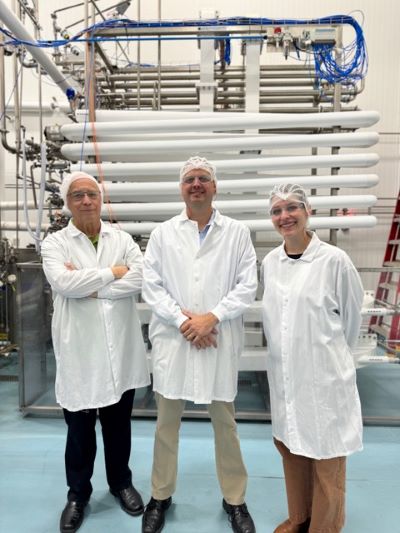
New FirstWave processing plant expands NC's food production capabilities
You could call SinnovaTek a Raleigh-based food technology company. But that would miss some significant nuances.
SinnovaTek is a privately held certified B corporation that is tapping its origins in North Carolina State University research, and North Carolina’s unique agricultural diversity, to upend food processing technology and, also, to address local and global agricultural waste and hunger issues.
B Corp certification is a designation that a business is meeting high standards of verified performance, accountability, and transparency on factors from employee benefits and sustainability metrics to supply chain practices and corporate governance.
SinnovaTek is primarily an equipment purveyor, but it has also spun out successful contract development and production businesses serving some of the nation’s largest consumer corporations, while still making it possible for small entrepreneurial North Carolina food startups to affordably test their ideas. The company’s FirstWave Innovations manufacturing subsidiary opened a small-scale facility in Raleigh in 2020, an 8,300-square-foot site for pilot manufacturing and for helping companies and entrepreneurs launch and test new products.
In September FirstWave Innovations began full-scale contract processing and packaging at a new $20 million, 62,500-square-foot plant in Nash County’s Middlesex Corporate Centre, about 35 miles east of Raleigh. The company says the newly upfitted industrial shell building is now one of the most advanced food-processing factories in the world. The company expects to double its staff, with some 25 new employees by the end of this year and as many as 75 employees there by the end of 2025.
SinnovaTek also markets the highly specialized food processing equipment it develops and uses, which primarily incorporates a technology called continuous-flow microwave thermal processing. It’s a platform that enables long shelf life and flavor and quality preservation of fruit- and vegetable-based fluid food products.
Think of it as a flow-through truck-sized microwave oven that only zaps juicy vegetation that is being forced through tubes at precise temperatures, pressures and velocities. The process kills unwanted microbes in the slurry, but it happens quickly enough to preserve color, nutrients and other desirable properties of the plant-based fluids.
Scaling production capabilities for companies big and small
Building on the commercial success of SinnovaTek's previous smaller-scale installations, FirstWave’s Middlesex site is scaling production of much larger commercial quantities of unique, nutritionally superior, shelf-stable, aseptically packaged (in a sterile environment) foods and beverages, including baby and toddler foods supplemented with “sensitive,” health-promoting ingredients.
Josip Simunovic, Ph.D., a research professor at NC State’s Department of Food, Bioprocessing and Nutrition Sciences, says the company achieves this level of product quality, stability and sensitive nutrient retention through a number of patented advanced processing technologies invented and developed over several decades by teams of faculty and student researchers at NC State.
Simunovic, a native of the Eastern European country Croatia, has become a true North Carolina transplant since earning his doctorate at NC State in 1998. He was mentored by Kenneth Swartzel, William Neal Reynolds Distinguished Professor Emeritus who is another aseptic processing pioneer and inventor.
Simunovic has since led numerous teams of faculty and student researchers at the Raleigh university. Licensing and commercializing the resulting technologies from NC State, he helped start more than 10 companies. He co-founded SinnovaTek in 2015 with President and CEO Michael Druga and Chief Innovation Officer Amanda Vargochik, who earned her master’s in food science at NC State. Simunovic serves as the company’s chief science officer. Another subsidiary, SinnoVita, provides R&D services to perfect ingredients in a wide range of plant-based foods. Simunovic says one the founders’ shared goals is to open consumers’ minds to the reality that

in FirstWave facility. -Photo from FirstWave
processed foods, when processed correctly, can be tasty and nutritious.
Importantly, the company’s unique patent portfolio also includes novel systems for temperature and flow measurements and safety validation of both homogeneous and complex particulate foods. These have led to the U.S. Food and Drug Administration’s clearance and the company’s market introduction of more than 200 new food and beverage products under a variety of brands, including those of some of the largest global consumer packaged goods (CPG) companies as well as small local, innovative startups. “Right now we have about half a dozen brand owners with a dozen products lined up to start production at our new Middlesex facility,” said Simunovic.
“Dr. Simunovic is a true genius and innovator who has contributed immensely to North Carolina’s agricultural infrastructure,” said Nandini Mendu, Ph.D., senior director of evaluation with the North Carolina Biotechnology Center’s focused initiative team. “We are delighted to have this FirstWave opening to expand our ag tech and food tech visibility worldwide."
In an interview with NCBiotech, Simunovic said the first industrial application of the technology spinning out of his lab came several years before he and his colleagues established SinnovaTek. It was actually with Yamco, a Snow Hill-based association of North Carolina sweet potato growers and farmers. “North Carolina has long been the nation’s largest producer of sweetpotatoes,” he said, “in large part because NC State had a fantastic multigenerational team developing varieties that helped our farmers maintain the lead.”
Getting it right around the holiday table
One related item in which North Carolina has played a leadership role: those involved in the industry have stumped for a universal change in the spelling of “sweet potato” for more than 30 years, to make it one word. In 2019, the North Carolina Sweetpotato Commission lobbied the general assembly to officially change the spelling of the state vegetable to “sweetpotato.” The measure passed and was signed into law by the governor. Advocates note that sweetpotato is a noun and not an adjective. They say “sweet” is not a descriptor, but part of the actual nomenclature for the vegetable technically known as Ipomoea batatas. This is different than a potato which uses adjectives like white, red or russet to describe Solanum tuberosum, an entirely different vegetable. And by the way, yams (Dioscorea sp.) are not even grown in the U.S. commercially. If you haven’t spent time in Africa, the Caribbean, South America or other areas where yams are cultivated, you’ve probably never even tasted one of the starchy tubers that are true yams.

Whatever the vegetable, one of the major problems in agriculture is crop waste, notes Simunovic. For example, sweetpotatoes were previously generally grown in North Carolina only to be marketed as baking potatoes, with a small number also used in canning operations. That meant North Carolina farmers left about 40% of their crop on the ground to rot, also distributing some in bulk containers to food banks, because those sweetpotatoes didn’t satisfy the size and shape requirements of the ideal baking potato that make it to grocery stores.
Then, along came the Simunovic technology, which later also got a major boost with a grant from NC State’s Chancellor’s Innovation Fund in 2014.
“We’d spent more than a decade at NC State working to develop a prototype system for effective food preservation,” recalled Simunovic. “Then one day we had a visit from Ron Fish, the assistant director of agribusiness with the NC Department of Agriculture and Consumer Services. He arranged a meeting with us and a team of sweetpotato growers.” At that time, says Simunovic, North Carolina led the nation in sweetpotato production by a margin of 34%.
“Soon we were able to produce a sweetpotato purée with our process, so the size and shape of a sweetpotato no longer mattered,” he said. The growers could scoop up all their crop, send the baking potatoes to that market, and process the former waste items into this purée that eventually ended up in hundreds of new, nutritionally enriched products. Some of the leftovers even became Covington, the first sweetpotato vodka in the market, named after the patented sweetpotato variety developed by the NC State scientist Henry M. Covington.
“The sweetpotato canning operations previously had to use an outdated, severe thermal process for a purée to be shelf stable, and it would lose 70% of thermosensitive nutrients like beta-carotene,” said Simunovic. “Our microwave aseptic process allows it to save 97% to 98% of beta-carotene, also known as pro-vitamin A.”
The rest, as they say, was history. Food companies now use sweetpotato purées in a lot of important products, Simunovic noted. In fact, each year SinnovaTek microwave technologies help turn millions of pounds of sweetpotatoes, carrots, mangoes, berries, apples, grapes and other foods once destined to rot into products such as purées or soups, smoothies and sauces. Food processed by FirstWave has a shelf life of a year to 18 months without refrigeration, Simunovic explained.
“We like to say that before we started that process, North Carolina was #1 in sweetpotato production by 34%, but still leaving 40% of the crop on the ground,” he said. “Now, 15 years later, North Carolina is still first – but now by 60% – even though sweetpotato production in the U.S. has doubled! We like to believe our process was part of that growth for North Carolina.”
Farmers around the world struggle with losses from food waste, Simunovic said, especially in Africa, where it often claims 70% to 80% of crops, partly due to small and inefficient distribution systems, lack of reliable electric grids and other struggles. As a result, SinnovaTek helped establish a food processing facility in Kenya in 2020, and it’s developing another in South Africa.
More new opportunities are unfolding
“Our products are still all homogeneous fluids, but beyond what we’re marketing now is the ability to make beverages and foods containing particulates,” said Simunovic. “We hope to be able to introduce things like bubble teas, and particle-loaded soups like minestrone and stews like goulash. These are still very much under development.”
Simunovic is like a kid in a candy store when he talks about the historic spool-up and now the successes and future possibilities.
“There were ups and downs and numerous explosions, but the technology is just magical,” he muses. “The ability to prevent both microbial spoilage and growth of pathogenic microorganisms depends on the temperature level achieved during sterilization. The higher the temp, the more efficient the inactivation is. For every 10 degrees Celsius you go beyond the 121-degree Celsius sterilization used in conventional canning, the effective rate of inactivation of pathogenic spores increases 10 times.
“The process, therefore, is timewise divided by 10 at that higher temperature. Therefore, our ability to preserve nutrients and flavors and colors and vitamins gets better as we go up in sterilization temperature. That is the theory behind the science of our technologies.”
Microwave technology turned out to do the trick. “The pathway the food must go through in microwave is much shorter in time, sometimes 100 times shorter than in canning. The resulting products are safe, shelf stable and have superior sensory and nutritional quality.”
He says he’s especially enthusiastic about baby foods because they fit well into the FirstWave sweet spot.
“Our biggest focus now is baby and toddler foods in aseptic pouches,” he said. “We don’t do our own brands. We co-pack for others. And the major advantage for the companies working with us is that the flavors, nutrients and their added supplements are preserved.”
Both SinnovaTek and FirstWave have been recognized with many industry, professional and government awards for innovation, product quality, sustainability and service. Simunovic was also recently recognized with a Lifetime Achievement Award by the International Association for Engineering and Foods.
